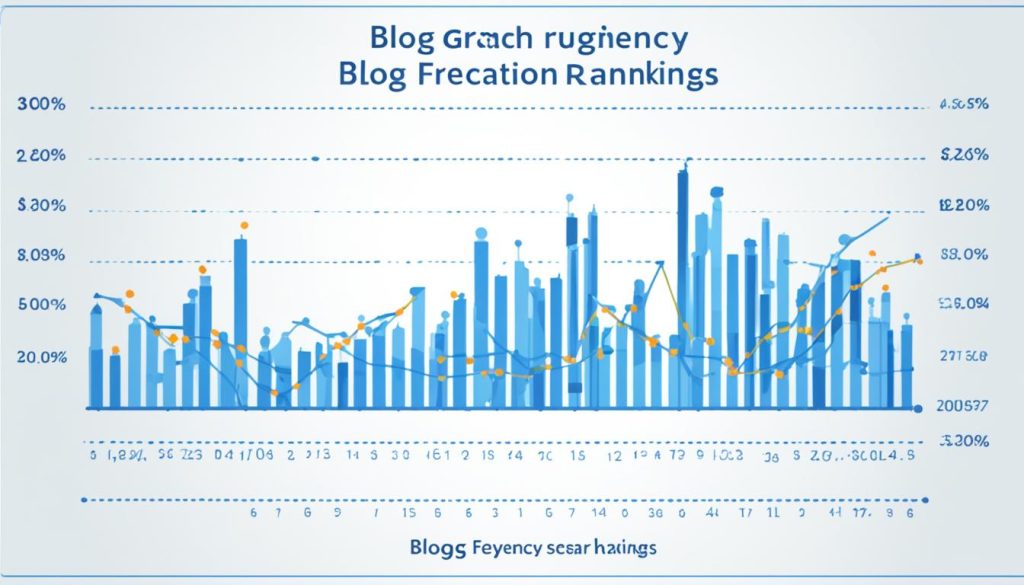Did you know that 57% of B2B marketers see search engine optimization (SEO) as their top marketing strategy? This fact shows how powerful SEO can be for your blog’s long-term income. By making your content search engine friendly, you can get a steady flow of income without much effort. SEO is like a continuous income source, and it’s time to use it to increase your blog’s earnings.
This guide will show you why SEO is key to making your blog a steady money-maker. We’ll cover how search engines work all the time and how SEO helps in the buyer’s journey. You’ll see why SEO is essential for boosting your blog’s income. So, let’s get started and learn how to use SEO to make your blog a money-making machine.
Why SEO Generates Long-Term Revenue
Search engine optimization (SEO) is a key strategy for boosting your blog’s long-term earnings. It taps into the constant search demand and shapes the buyer’s journey. This leads to sustainable outcomes that can change your business for the better.
Search is a 24/7 Business
People use search engines like Google all day, every day to find what they need. On average, each person does 3-4 searches daily, adding up to over 5.8 billion searches on Google daily. By using SEO to improve your search ranking, your blog can be seen by these searches and make money all the time.
Search is a Part of the Buyer’s Journey
Now, search engines are a key part of how people shop. Research shows 56% of buyers have bought something after reading a company’s blog. Also, 10% of marketers say blogging gives the best return on investment. SEO helps bring more people to your blog, helping you reach potential customers at different stages of their buying journey.
Search is a Leading Revenue Driver
Organic traffic, or people finding your blog through search, makes up over 40% of a business’s revenue. This makes SEO a top way to make money, as it brings in a steady flow of targeted visitors. By making your content and website search-friendly, you can tap into this strong source of ongoing revenue for your blog.
Why SEO Requires a Long-Term Commitment
SEO is like running a marathon, not a sprint. It takes a long-term commitment from businesses for lasting success. Instant results might seem appealing, but SEO is a slow process. Your competitors are already using SEO to get ahead.
SEO Takes Time to Set Up
SEO is not just a one-time task. It’s an ongoing effort that needs constant work and improvement. Creating valuable content and optimizing your website takes time. It can take months before you see more website traffic and leads.
Google is Slow
After optimizing your website, it can take Google weeks or months to index and rank your content. Google’s indexing process is complex and takes time. Be patient and keep working on your SEO as you wait for results.
Competitors Use SEO
Your competitors are probably using SEO to draw in customers too. To beat them, you need to keep improving your SEO strategy over time. Watch your competitors’ SEO moves and adjust your strategy to stay ahead.
Understanding SEO’s long-term nature is key for businesses wanting to grow online. By sticking with a solid, ongoing SEO plan, you can keep your blog or website visible and profitable in the changing search world.

Benefits of SEO for Blog Revenue
SEO takes time to work, but it’s worth it for your blog’s growth. SEO leads have a 14.6% close rate, much higher than traditional marketing’s 1.7%. This means SEO is 8.5 times better at making sales.
SEO does more than just bring in leads. A huge 85% of retailers say SEO and PPC are top tactics for getting new customers. This shows how powerful SEO is for blog revenue and customer acquisition.
SEO also makes your blog more credible and known. When your blog ranks higher in search results, more people see it. This leads to more lead generation and customer acquisition.

SEO is key for a successful blog. It opens up new growth chances, boosts your online presence, and increases blog revenue. This is done through better lead generation and customer acquisition.
Importance of Blogging for SEO
Blogging is a key way to boost your website’s SEO and bring in more organic traffic. By posting blogs regularly, you make your site a go-to spot for your audience. This helps you stand out as an expert in your field.
Organic Click-Through Rate
Blog posts can increase your organic click-through rate by targeting various search queries. When your blog shows up in search results, it grabs users’ attention. This leads to more clicks, more traffic, and more engagement on your site.
Index Coverage
Regular blogging can also boost your website’s index coverage on search engines. Search engines like Google need to index a page to rank it. By posting new blog content often, you get indexed more frequently. This makes your site more visible in search results.
Backlinks
Backlinks from other sites to your blog posts tell search engines your content is valuable and trustworthy. By sharing valuable blog content, you can get backlinks from industry leaders. This boosts your site’s credibility and search rankings.
Internal Links
Using internal links in your blog posts helps users and search engines find their way around your site. These links connect to other relevant pages on your site. This makes your site easier to navigate, improves the user experience, and helps search engines find more of your content.
Blogging for SEO opens up many chances to draw in organic traffic, build your brand, and grow your business over time.

Developing a Blog SEO Strategy
Creating a strong blog SEO strategy is key for your business’s long-term growth. It includes important parts like competitive research, keyword lists, and an optimization proposal. With search engines changing often and business goals shifting, having a strategy helps measure your success.
A good blog SEO strategy has three main parts:
- Identify your target audience: Know what your readers like, what problems they face, and what they search for. This helps make content that hits the mark and ranks well.
- Conduct keyword research: Find out what keywords and phrases your audience uses. Then, make your content better to be more visible and draw in the right visitors.
- Utilize analytics: Check how people interact with your content, track important metrics, and use data to improve your blog over time.

With a detailed blog SEO strategy, you can make your content more visible in search engines. This brings in more relevant traffic to your site. It also helps increase your blog’s earnings potential.
Blog SEO Best Practices
Optimizing your blog for search engines is key to making money over time. To boost your blog’s SEO, focus on several important steps. Let’s look at how you can make your blog better with smart SEO moves.
Identify Your Target Audience
Start by knowing who you want to read your blog. Make buyer personas that show what your ideal readers like and need. This helps you write content that connects with them and keeps them interested.
Conduct Keyword Research
Good keyword research is vital for blog SEO. Find out what keywords your readers use and add them to your posts. This makes your blog easier to find in search results and attracts more readers.
Add Visuals
Using images, infographics, and videos can make your blog better for SEO. Search engines like content with visuals because it’s more engaging. Make your visuals better with good file names, alt text, and captions to help your SEO.
Write Catchy Titles
Your blog post’s title is what catches the eye first. Write titles that grab attention with strong words and emotions. Make sure they match your post well and include the keywords you found.
Include Enticing CTAs
Use calls-to-action (CTAs) to get your readers to do something next, like subscribe or buy something. Good CTAs can increase conversions and make your blog more engaging.
Follow these blog SEO tips to make your content more visible and successful. This can bring more visitors and money to your blog. Remember, SEO is always changing, so keep improving your strategies to stay ahead.
Understand User Intent for Better SEO
SEO has changed from just focusing on keywords to understanding what users really want. By making your content match what people are searching for, you can rank better and give users a better experience.
To get what users want, start by looking at the questions your audience asks online. Use tools like Google’s People Also Ask and Answer the Public to find out what people are searching for. Make sure your content answers these questions clearly and simply.
- Find out what users really want from their searches, like information, directions, or to buy something.
- Make your content fit where users are in their buying journey, whether they’re just looking, comparing, or ready to buy.
- Keep an eye on how users act, like how long they stay on your page and if they make a purchase, to make your content better.
By focusing on what users want, not just keywords, you can make content that ranks well and connects with your audience. This leads to more engagement, more sales, and more money for your blog.

Technical SEO for Revenue Boost
Boosting your website’s technical SEO is key to making more money. Technical SEO means making your site easy for search engines to read and understand. This includes things like website speed, mobile optimization, and structured data. These factors greatly affect your search rankings and, in turn, your earnings.
Making your website faster is a top technical SEO move. People want pages that load quickly, and search engines reward fast sites. You can speed up your site by reducing image sizes, simplifying code, and using browser caching.
Being mobile-friendly is also crucial for technical SEO. More people use smartphones to access the internet. So, your site must work well on mobile. This means making sure your layout, content, and navigation are easy to use on smaller screens.
- Implement a mobile-first design approach
- Optimize images and other media for mobile devices
- Ensure easy navigation and clear CTAs on mobile
Structured data is a strong tool for technical SEO. It helps search engines understand your website better. By adding structured data markup, you give search engines extra info about your pages, products, or services. This leads to more accurate search results.
Keeping up with technical SEO is an ongoing task, but it pays off. By focusing on website speed, mobile-friendliness, and structured data, you can boost your search rankings. This leads to a better user experience and more revenue for your blog.
SEO for Blog Revenue
Mastering search engine optimization (SEO) is key to boosting your blog’s revenue. By using advanced SEO tactics, you can improve your website’s technical aspects and create engaging content. This will help increase traffic, engagement, and revenue for your blog.
To improve your blog’s SEO, focus on what your audience wants. Do thorough keyword research to find out what your readers are searching for. Then, make content that meets their needs and interests. This will make your blog more visible in search results and more likely to engage readers, turning them into customers or subscribers.
Understanding user intent is also important. Make sure your blog loads fast, is easy to use on mobile, and has a smooth navigation. Improving your site’s structure, URL, and image optimization can also boost your SEO and revenue.
Creating high-quality, in-depth content is crucial. Research your topics well, use credible sources, and update your content regularly. By focusing on content depth and quality, you can beat the competition and increase your blog’s earnings.
By using these advanced SEO tactics, you can unlock your blog’s full potential and increase its revenue. SEO is an ongoing process that requires dedication and a long-term commitment. Keep refining your SEO strategy to maximize your blog’s earning power.
Focus on Content Depth and Quality
In today’s digital world, just having more content isn’t enough for SEO success. The focus is now on the quality and depth of your articles. High-quality content that gives valuable insights and deep information draws in more qualified traffic. This can increase your customer lifetime value.
Thoroughly Research Topics
To engage your audience, spend time thoroughly researching your topics. Going deep into the subject and offering new views can make your blog stand out. Use reliable sources to support your content depth.
Use Reliable Sources
The sources you use greatly affect content quality. Using authoritative and trustworthy references boosts your content’s value. It also tells search engines your blog is a reliable source. The Google E-E-A-T model (Expertise, Authoritativeness, Trustworthiness) helps create content that connects with your audience.
Regularly Update Content
Keeping your blog up-to-date is crucial in a changing digital world. Regularly updating your content keeps your readers informed with the latest and most accurate info. This can improve your content quality and depth for search engines. By keeping up with industry trends and new topics, you keep your blog relevant and authoritative.
Focus on content quality, depth, thorough research, and regular updates. This approach makes your blog rank well in search and offer real value to readers. It’s a powerful way to drive long-term revenue growth for your business.
Leveraging Advanced SEO Tactics
Basic keyword optimization is a good start, but to really boost your blog’s earnings, you need to dive into advanced SEO tactics. Understanding what users want helps you make content that hits the mark. This leads to better search rankings and stronger connections with customers.
Improving your site’s technical parts, like speed and mobile-friendliness, makes search engines work better. It also makes your site easier for users to navigate. This can lead to people spending more time on your site, engaging more, and buying more.
It’s important to focus on making quality content, not just a lot of it. Doing deep research, using trusted sources, and keeping your content fresh draws in a better audience. It builds trust and makes your blog a go-to source in your field.
- Understand user intent to create meaningful content
- Optimize technical SEO elements for enhanced user experience
- Focus on content depth and quality over quantity
| Tactic | Impact on Blog Revenue |
|---|---|
| Understanding user intent | Improved search rankings and stronger customer relationships |
| Technical SEO optimization | Better indexing by search engines and enhanced user experience |
| Prioritizing content quality | Attracts more qualified traffic and builds trust with the audience |
Using these advanced SEO tactics, you can open up new ways to increase your blog’s income. You’ll also solidify your status as a top expert in your field.
Staying Ahead of the Competition
To keep your blog’s revenue growing, you need to stay ahead of your competitors. This means being proactive and adaptable. You should regularly do keyword research, create a flexible content strategy, and work on your website’s technical aspects.
Starting with keyword research is key. It helps you find new opportunities and trends in your field. By watching search queries and looking at your competitors, you can find keywords that bring more traffic to your blog. This lets you make content that meets your audience’s needs and interests.
Next, having a good content strategy is vital. Keep an eye on how users behave, adjust to changes in search engines, and make quality blog posts. This way, you stay relevant and engaging. Your content should hit the mark with keywords and offer real value to your readers, making them want to return.
Lastly, don’t forget about your website’s technical aspects. Check and improve things like site speed, how it looks on mobile, and structured data. These improvements make your blog more visible and user-friendly. By fixing technical SEO issues early, your content becomes easier to find and access for your audience.
With a detailed, forward-thinking SEO competition strategy, you can grow your blog’s revenue over time. Stay alert, flexible, and focused on giving your readers great value. This way, you’ll beat your competitors in the changing world of search engine optimization.
Refining Your SEO Strategy
It’s key to keep improving your SEO strategy for long-term success. Search engines and user habits change often. So, it’s important to check your data, see how your tactics are doing, and tweak them as needed. This might mean looking at your keyword targeting, changing your content, or making your website’s technical parts better.
By always working on your SEO, you can beat the competition and keep your blog making money. Look at your data and see where you can get better. Update your SEO strategy often to keep up with changes in search engines and stay ahead in the game.

